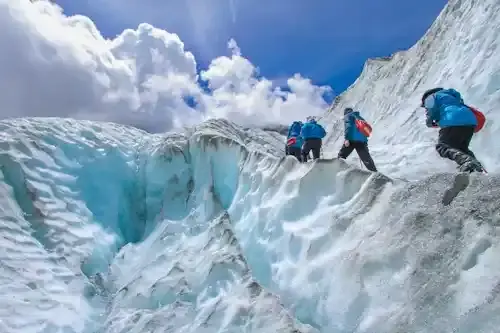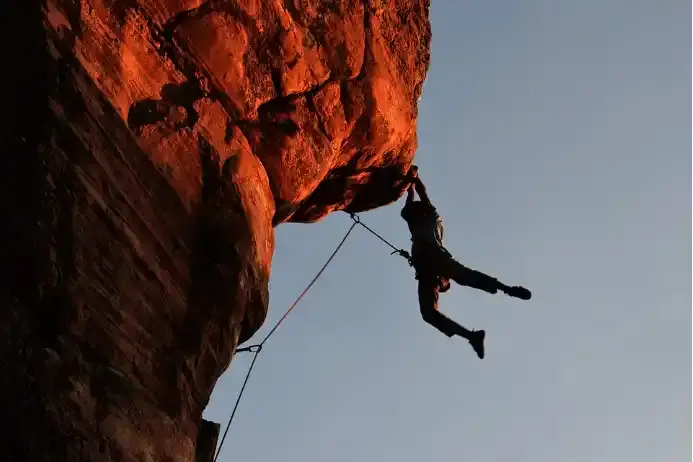Why do people climb mountains? Do you climb mountains only to get to the top?
Mountaineering is an endeavor that goes beyond just reaching the top. While the desire to stand on top is certainly a motivating factor, the reasons why people climb mountains are varied and often highly personal. In this article, we show some of the main motives behind people climbing mountains.
1- Challenge and personal achievement:

One of the main reasons people climb mountains is to challenge themselves; mountaineering requires physical effort, strength, endurance and mental courage. For many climbers, the challenge of overcoming difficult terrain, extreme weather conditions and physical limits is a way to test their abilities. Reaching the top becomes a symbol of personal achievement and a reward for their hard work and determination. In fact, nothing increases one's self-confidence more than climbing a difficult peak; relying entirely on body or physical strength to move yourself up a rock or over a rock wall is one of the most inspiring things.
Recommend
2- Contact with nature:

Mountains provide a unique connection to the natural world, and often dreadful. The opportunity to immerse yourself in the pristine wilderness, away from the noise and distractions of everyday life, is a strong attraction for many climbers. The tranquility, beauty and grandeur of the mountain landscape also provide a sense of peace and spiritual renewal. For some people, climbing is a way to feel close to nature and experience the world in its original and rougher form.
3- Adventure and exploration:
The spirit of adventure is another major motivator. Mountains represent all that is unknown, unexplored, and unexpected. Mountain climbing can be thought of as an act of exploration, with each ascent presenting new experiences, challenges and discoveries. The thrill of adventure and the opportunity to explore remote and untouched parts of the world is also a compelling reason to take the risks associated with mountaineering.
4- Companionship and belonging to a group:
Mountaineering often involves teamwork and collaboration, especially in challenging and artistic climbing activities. The bonds that form with fellow climbers during expeditions can be deep and permanent. Sharing the experience of overcoming adversity and working together to reach a common goal and mutual support in difficult moments creates a strong sense of complacency. Many climbers are attracted to the sense of belonging to a group, the common purpose that comes from being part of a climbing group.
5- Personal growth and self-discovery:

Mountaineering can also be a journey of self-discovery, because the physical and mental demands of climbing force people to face their fears, doubts, and physical and psychological limitations. The solitude and meditation that comes with spending time in the mountains can also lead to deep personal insights and self-growth. Many climbers find that the climbing experience helps them develop greater flexibility, confidence, and self-awareness.
6- Spiritual and philosophical reasons:
For some, mountaineering has a spiritual or philosophical dimension; mountains have long been associated with transcendence and a sense of attachment to something greater than oneself. Climbing can be a form of meditation or a way to search for meaning and purpose in life. The act of reaching the top can symbolize a spiritual journey, representing overcoming obstacles and seeking a deeper understanding of life.
7- Fitness and health:
Mountaineering is an excellent way to stay healthy; the physical requirements of climbing, which include endurance, strength, flexibility and balance, make it a holistic exercise. Many people are attracted to climbing as a way to improve their fitness while enjoying the outdoors. The combination of exercise and fresh air in beautiful natural environments is a powerful incentive for mountaineers.
8- Overcoming fears:

Mountaineering is not without risks, and fear of heights, falls or the unknown can be a major obstacle. For some climbers, facing and overcoming these fears is a key motivation. Successfully completing the climb can be a radical change, helping individuals build the confidence and resilience that will move into other areas of their lives.
9- Cultural and historical importance:
Some climbers derive their motivation from the cultural and historical importance of some mountains. Peaks such as Mount Everest and Kilimanjaro occupy a special place in mountaineering history and are symbols of perseverance and human achievement. Climbing these famous mountains allows people to connect with the legacy of those who came before them and become part of a long tradition of exploration and adventure.
10- Joy and passion:
Mountaineering is associated with the joy and passion it brings. The experience of moving through the mountains, the feeling of freedom, and the euphoria of reaching the top are rewards in themselves. For practitioners, the process is as important as the destination, if not more. The journey, with all its challenges and rewards, is what makes mountaineering so satisfying.
What to remember:

When going out on a mountain adventure, always remember the words of Norwegian explorer and leader of the first expedition to reach the South Pole, Roald Amundsen: "An adventure is just bad planning." So you should take the following things with you:
Backpacks stuffed with snacks, water bottles and layers of clothing,
First aid kit,
Ropes and climbing nails,
Tent and a range of assorted camping supplies,
a pair of walking shoes on the floor and on the snow if needed,
a pair of walking sticks,
Snow nails or ice axes if needed,
rain jackets, winter gloves and hats,
sunglasses,
A means of communication to ask for help. Remember that there may not be a mobile phone signal at the top,
Remember to let some people know the expected itinerary so they can look for you.
Although reaching the top is an important part of mountaineering, it is not the only reason people are attracted to mountains. The motivations for climbing are very diverse, and include physical challenge, connection to nature, adventure, companionship, personal growth, and more. Ultimately, mountaineering is a multifaceted experience that offers something unique and meaningful for everyone taking on the challenge. Remember the importance of being prepared, respecting nature and being unpredictable, because mistakes at the top are fatal.








